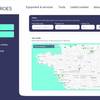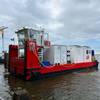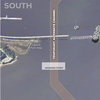The Marine Advanced Technology Education (MATE) Center, headquartered at Monterey Peninsula College in Monterey, California, is a National Science Foundation (NSF)-funded partnership of organizations concerned with marine science and technology education. The MATE Center coordinates and facilitates the development of educational programs in marine science and technology involving grades 9-16, with an emphasis on community colleges. In the Monterey Bay region, MATE and Monterey Peninsula College have developed a new Marine Science and Technology Associate Degree and Certificate Program that begins this Fall 1999 semester with courses geared to prepare students for careers in marine science and technology. In recognition of the importance of hands-on learning, the MATE Center has also developed technical internship programs designed to give interested students the opportunity to work with employers and gain valuable on-the-job experience.
"Over one million marine technicians are employed on land and at sea in such diverse activities as operation of remotely-operated vehicles (ROVs), environmental monitoring, marine electronics, offshore oil and gas development, aquaculture, remote sensing, coastal and oceanographic engineering, and marine resource management," explains Deidre Sullivan, MATE's Curriculum and Industry Manager. "The need for an educational system to meet the challenge of preparing individuals for this growing and diverse job market has never been greater." Funding from the NSF's Advanced Technological Education (ATE) Program established the MATE Center to meet this challenge.
"By improving the education and training in ocean-related occupations, the Center seeks to fulfill the needs of America's workforce and employers - employable skills and employable people," says Nicole Crane, MATE's Program Director. The Center emphasizes partnerships between educational institutions and industry, military, government, research, and labor organizations. These partnerships facilitate the development of courses and educational programs based on industry-established skill guidelines, internships, and on-demand training and education of people already working in the marine field.
The new MATE/Monterey Peninsula College program offers students both an Associate of Science Degree and a Certificate in Marine Science and Technology. Housed within the Life Sciences Division, this program is the newest technical program offered at Monterey Peninsula College. Monterey Peninsula College is a comprehensive, two-year community college with vocational training and job enrichment curricula in over 50 technical fields. The College features guaranteed transfer agreements with many University of California and California State University campuses, including the California State University Monterey Bay.
To develop the new curriculum, the MATE Center worked to identify the needs of the marine science and technology workforce through both national and regional surveys and focused workshops, with employers and technicians, which target specific regions or occupations. "The MATE Center and its partners have collected information on the knowledge and skills needed to perform well in a number of marine-related occupations," explains Sullivan. These technical fields include shipboard technology, hydrographic surveying, aquaculture, oil spill response, marine research, and ROV operation and maintenance. The information gathered was used to develop skill guidelines for curriculum development.
"Based on industry input as well as job market analysis, the Marine Science and Technology Program curriculum focuses on specific areas within the broad categories of marine technology and instrumentation, coastal and oceanographic monitoring, and aquatic animal husbandry," explains Crane. These specific areas include ROV operation and maintenance, marine instrumentation and remote data collection, aquaculture, shipboard technical operations, and field methods. MATE staff and Monterey Peninsula College faculty have developed the Marine Science and Technology curriculum working in collaboration with the Monterey Bay Aquarium, the Monterey Bay Aquarium Research Institute, Deep Ocean Engineering, Sonsub International, the U.S. Navy, and other regional and national marine-related businesses.
The curriculum includes the following new MATE courses: Marine Science and Technology, Cartography and Geographic Information Systems (GIS) in Environmental Applications, Field Methods in Marine Science and Technology, Careers in Marine Science and Technology, Aquatic Husbandry I: Aquarium Technology, Aquatic Husbandry II: Aquaculture and Mariculture, Research Diving and Safety, Introduction to Remotely-Operated Vehicles (ROVs), and Map Making and Field Skills in the Earth and Marine Sciences. Other courses within the program include: Computer Use in the Biological Sciences, Fundamental Chemistry, Introduction to Physics, Technical Writing, Elementary Statistics, Introduction to Coastal Navigation, Visual Basic for Rapid Application Development, and Marine Electronics. Additional courses will be added as new information from employers, educators, and students shapes program development.
Internship experience is also an important and required component of the curriculum. "Employers tell us over and over again that experience is one of the most important things on an applicant's resume," comments Forrest Melton, MATE's Internship Coordinator. In recognition of this, the MATE Center, with supplemental funding from the NSF, launched a technical internship program this summer focussed on shipboard technical operations. Both the University-National Oceanographic Laboratory System (UNOLS) Fleet, a fleet of research vessels supported in part by the NSF, and the Ocean Drilling Program (ODP), an international partnership of scientists exploring the sea floor, are hosting these paid internship positions. Working with a marine technician onboard a research vessel, students have the opportunity to develop their technical, scientific, and interpersonal skills.
The MATE Center and Monterey Peninsula College have also arranged internships with many private companies and government agencies in the Monterey Bay region. Plans exist to expand the program nationwide in the near future. Available internship opportunities include paid and unpaid positions in marine technology, marine and biological research, field sampling and monitoring, conservation, environmental chemistry, water quality, aquaculture, diving, marine construction, marine electronics, environmental consulting, GIS, and others.
Through its web site, on-line news updates, and newsletter, the MATE Center also serves as a resource for students, employers, and educators interested in marine-related careers and workforce development. The Center offers faculty development opportunities, including workshops and summer institutes designed to expose faculty and teachers to the technical side of marine industry/applications.
For more information on the MATE Center and the new Marine Science and Technology Program, including course descriptions, degree and certificate requirements, and suggested course sequence, contact the Center office at Monterey Peninsula College, 980 Fremont Street, Monterey, CA tel: 831-645-1393 or [email protected]. For information on registration procedures, contact the Monterey Peninsula College Registration Office at tel: 831-646-4010. Information about the Center, including currently available internships, is also available on the MATE web site at www.marinetech.org
Subscribe for
Maritime Reporter E-News
Maritime Reporter E-News is the maritime industry's largest circulation and most authoritative ENews Service, delivered to your Email five times per week










